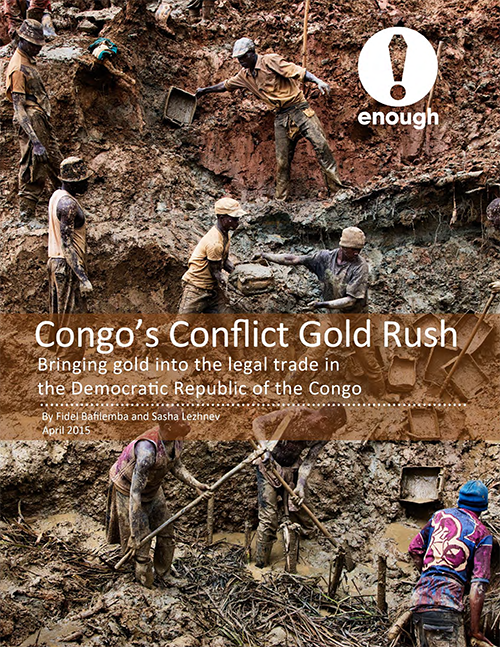
This brief stems from our new report Congo's Conflict Gold Rush: Bringing gold into the legal trade in the Democratic Republic of the Congo, which provides an in-depth discussion of solutions to the conflict gold supply chain.
How Prominent is the Conflict Gold Problem?
Despite the dip in global gold prices, eastern Congo is going through a gold rush: a conflict gold rush. Gold is highly valuable in small quantities—half a million dollars’ worth can fit in a briefcase—which incentivizes armed commanders to turn to gold to finance their operations. Warlord-like commanders in Congo’s army, as well as armed groups from the FDLR to Mai Mai Sheka, profit by extracting illegal taxes from miners, owning mine pits, and selling gold for arms and ammunition. According to the United Nations, approximately 98 percent—or $400 million—of gold produced by artisanal miners in Congo is smuggled out annually, and gold miners often work under dangerous and exploitative circumstances.
Who Benefits From the Conflict Gold Trade?
Abusive Congolese army commanders, rebel leaders, and corrupt regional government officials benefit significantly from this trade and are responsible for continued attacks on local communities, rape, and pillage. Notably, the FDLR rebel group (composed in part by alleged perpetrators of the Rwandan genocide) as well as Mai Mai Sheka (the alleged mastermind of the rape of over 200 women in four days) control many of the areas where conflict gold is mined. The illegal trade also benefits the smugglers and their accomplices who transport gold across the border into Uganda, Burundi, and Dubai to be sold into the global market. Dubai’s largest gold refinery, Kaloti, was de-listed from the “Dubai Good Delivery list” in April 2015 for allegedly not following responsible gold sourcing practices.
How Can Congo, the United States, and International Actors Support a Conflict-Free Gold Trade in Congo?
Combating the conflict gold trade and turning it into a legal trade will be a long process, but strong additional efforts in three main areas would make a big difference in contributing to peace and security in eastern Congo.
1. Certification and validation of mines:
Congo currently certifies gold exports as “conflict-free” through the International Conference on the Great Lakes Region’s (ICGLR) regional minerals certification system – but the process has many loopholes right now. The U.S. State Department should urge Congo’s Mining Ministry to stop issuing ICGLR certificates for gold exports until key steps are taken to address these loopholes. Additionally, the proposed European Union conflict minerals regulations should include a provision to provide funding to mine inspection missions to assess mines on conflict issues in Congo as well as to livelihood initiatives for Congolese mining communities.
2. Consequences for corruption and smuggling:
The smuggling network from Congo results in a tremendous loss of money that should be benefiting the Congolese people. The U.N. Security Council should designate well-documented conflict gold smugglers in Congo, Uganda, and Burundi for targeted sanctions. Furthermore, national courts and the International Criminal Court should investigate and prosecute these smugglers.
Additionally, to encourage the legal trade, Congo’s Mining Ministry must be pressured to begin a comprehensive anti-corruption initiative and work with the provincial governors in eastern Congo to significantly lower the overall gold tax rate of 13 percent to one more in line with international norms.
3. Livelihoods and responsible investment:
The Congolese Mining Ministry should facilitate a process for Congolese miners to access the formal economy. The U.S. Congress and the European Union should also authorize funding for alternative livelihood programs for artisanal mining communities.
Socially responsible investors, jewelry retailers, and other concerned groups can bolster the conflict-free gold trade by setting up a responsible fund for Congolese gold. The World Bank should complement this effort by funding geological exploration of mining areas in eastern Congo in order to help open up other mines for responsible investment.
To learn more, read our report on Congo’s conflict gold rush, and our Conflict Gold 101 Activist Brief.

